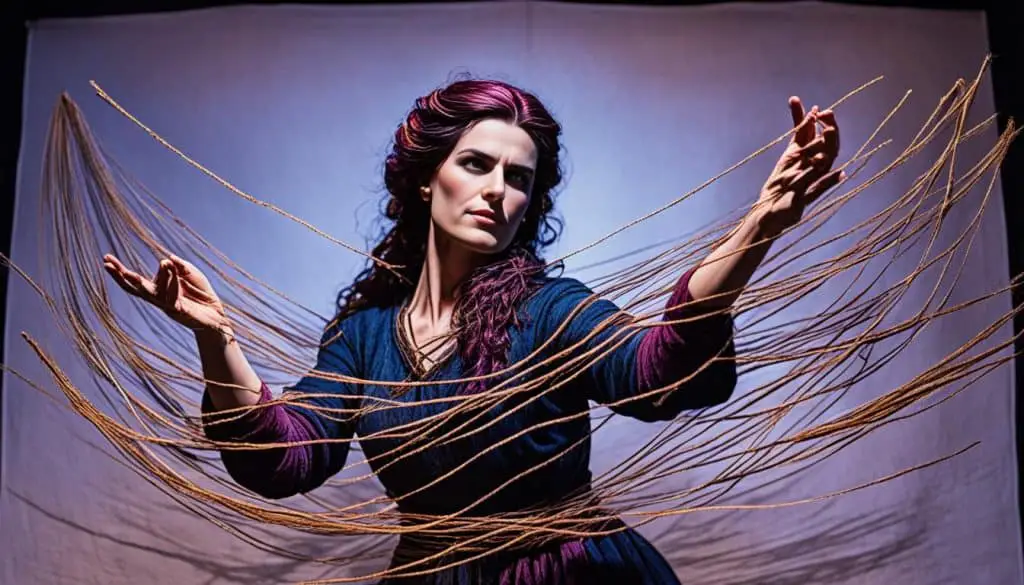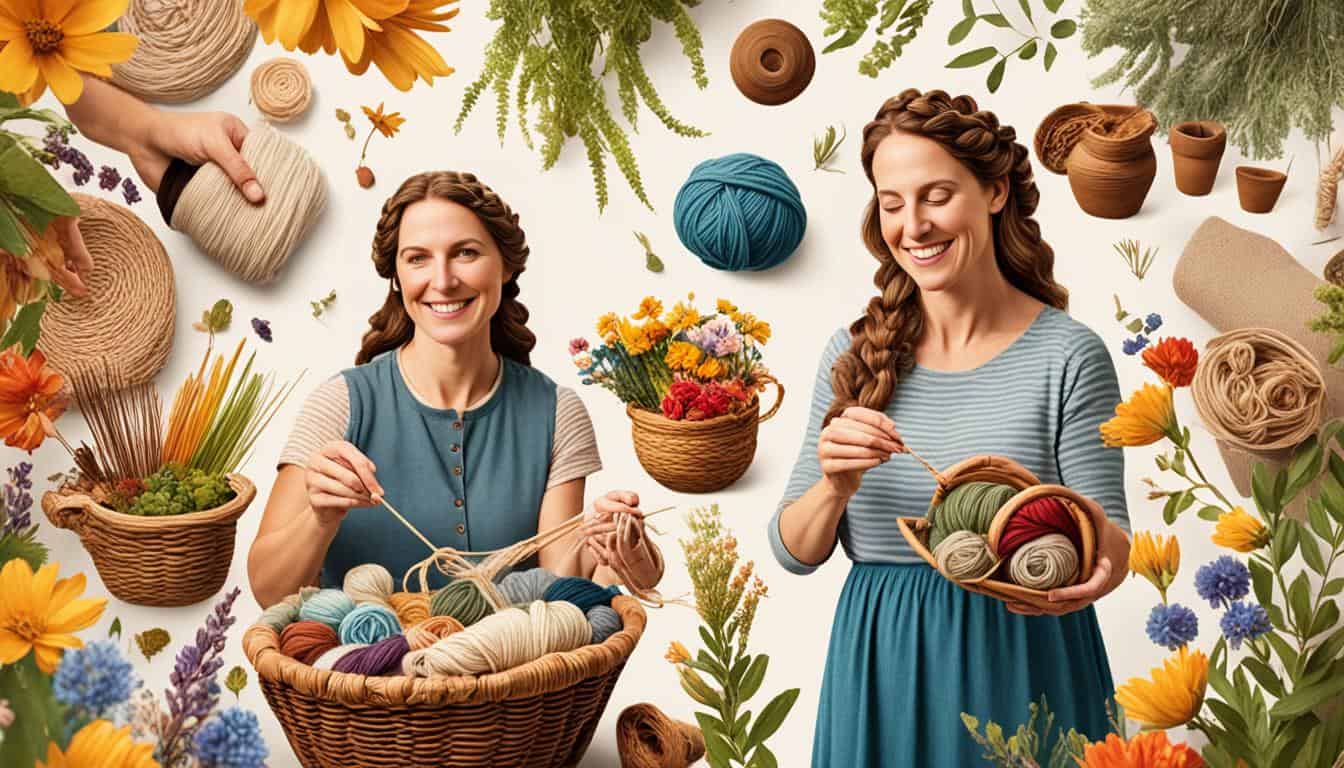Table of Contents
Did you know women in the Bible weren’t just at home? They were also skilled in many areas. They were artisans, businesswomen, and leaders. They made significant contributions in ancient Israel. Let’s look at how crafts of biblical women influenced their society.
These women did more than just stay at home. They helped build sacred places like the Tent of Meeting. They managed vineyards and worked in the markets. They were experts in what they did. And they changed their communities for the better.
Exploring these women’s stories can change our view of their roles in the Bible. Join us to find out about their skills, talents, and what they did. Much of what they achieved has been forgotten.
Are you excited to learn about these amazing women and their crafts? Let’s get started!
The Women of Exodus: Spinning and Weaving
In Exodus, there’s a special group of women known for their spinning and weaving. They were important in making the tabernacle and its sacred pieces. These women combined blue, purple, scarlet, and linen threads or spun goats’ hair as needed, showing their expertise.
These skilled women gave both their time and resources for the tabernacle. This special place was key for the Israelites on their journey. Notably, they made coverings for the tabernacle. These coverings kept everyone inside safe and comfortable.
These same women also made clothes for the priests. These clothes represented the priests’ connection with God and their special duty. The women’s work made the priestly garments beautiful and respectful.
In their time, knowing how to spin and weave was highly respected. It took skill and special knowledge. The women from Exodus used these skills to help their community in worship.
The Significance of Women’s Crafts in the Tabernacle
The work of these women in making things for the tabernacle wasn’t just about creating items. By putting their heart and skill into these items, they made the place full of faith and meaning. Their creations made the tabernacle more than just a building; it became a place where people felt close to God.
The tapestries and clothes these women made were more than just beautiful. They were a way to show their deep faith in God. Their work was a reminder of the beliefs and practices that guided their lives.
A Table Illustrating Women’s Contributions to the Tabernacle
| Women’s Contributions | Significance |
|---|---|
| Spinning and Weaving | Creation of tent coverings and priestly garments |
| Symbolism | Connecting the people to their faith through craftsmanship |
| Visual Representation | Instilling beauty, honor, and holiness in the tabernacle |
The work of these women was crucial in making the tabernacle. Their effort and skill made the tabernacle a sacred place. They set an example in showing deep respect for their faith. Looking into more stories, we’ll see how other women played essential roles in the Bible.
Rahab the Harlot: Flax and Thread
Rahab was from Jericho, known for her bravery and faith. She didn’t fear the Israelites but saw their power. So, she helped them, saving their spies.
“I know that the Lord has given you the land, and that the terror of you has fallen upon us, and that all the inhabitants of the land have melted away before you.” – Rahab (Joshua 2:9)
This brave act changed Rahab’s life. Because she helped them, the Israelites promised to keep her and her family safe in Jericho.
“Behold, when we come into the land, you shall tie this scarlet cord in the window through which you let us down, and you shall gather into your house your father, your mother, your brothers, and all your father’s household.” – Joshua 2:18
Rahab likely worked with flax and thread, though the Bible doesn’t say directly. Flax was a fiber used in making linen.
In ancient times, Rahab may have made ropes or cords with her textile skills. These items were very important in Jericho for building, daily use, and trade.
Working with textiles made Rahab valuable in her community. Her knowledge of crafting with flax and thread was respected.

By learning about Rahab, we see how skilled women were in the Bible. Her work with flax and thread shows her resourcefulness. It also shows how she met her community’s needs.
The Significance of Rahab’s Craft
Rahab’s talent with flax and thread is more than just practical. It has a deeper meaning in her story. Flax and the textiles made with it symbolize the fabric of her life and relationships.
The act of putting a scarlet cord in her window has meaning. It connects Rahab’s work with her faith in Israel’s God. The cord symbolizes her faith in God’s promises and her support for His people.
Rahab’s brave and skilled actions saved her family and herself. Her story shows God’s redemption is for everyone, despite their past.
Flax and Thread in the Bible
Flax and thread are important in more Bible stories than Rahab’s. They were used in many sacred places and items in the Old Testament.
For example, in Exodus 35:25-26, women are praised for making fine linen. This linen was used in the Tabernacle and for the priests’ clothes.
Seeing how flax and thread were used helps us appreciate women like Rahab. They used their skills to support ancient Israel’s sacred activities.
The Legacy of Rahab
Rahab’s story is about more than her past. It celebrates her courage and faith that inspire people today.
Mentioned in Jesus’ family line in Matthew 1:5, Rahab shows how important she is. Her work with flax and thread reminds us of the varied roles women had in ancient times.
Her story teaches us not to judge by occupation or background. It shows how God can use anyone, like Rahab, for great things.
Proverbs 31:10-31: The Woman of Valor
In the book of Proverbs, there’s a special section praising a woman. She’s called the Woman of Valor. This part, from verse 10 to verse 31, talks about her many skills and good qualities.
The Woman of Valor knows how to make things and run a business well. She’s great at making clothes by spinning and weaving. Plus, she’s good at growing grapes to make wine.
She doesn’t stop at making things. She’s also smart in business. She knows how to buy and sell, which means she’s into trading. She even owns land, which shows she’s good with her money.
Proverbs 31 shows us that women in ancient Israel did all kinds of work. They weren’t just doing housework. They also worked in crafts and business. This changed how people saw women’s roles back then.
“Charm is deceptive, and beauty is fleeting; but a woman who fears the LORD is to be praised.” – Proverbs 31:30
Proverbs 31 is a powerful piece about women. It talks about how their many skills and good hearts matter. It says real beauty is in a woman’s actions and her love for God.
The Multifaceted Woman of Valor
The Woman of Valor is the best example of strength, wisdom, and hard work. She uses her talents to clothe her family with the best. Her work in the vineyard keeps her family well-fed.
Her smartness in trade shows she’s a good businesswoman. Owning property proves how she secures her family’s future.
Her skills tell us women did all kinds of work in the old times. They were found in many jobs and helped their communities thrive.
An Image of Strength and Virtue
The Proverbs 31 woman is both skilled and respected for her good heart. She’s strong and well-liked by those near and far.
She helps the less fortunate, showing her kindness. She’s always ready to help others, teaching us to do the same. She’s an example of doing right and living well.
Her faith in God is also a big part of who she is. It tells us how important spirituality and faith are to a woman’s life and mission.
The Woman of Valor in Proverbs 31 is a key figure in celebrating women’s abilities. Her focus on doing well in everything she does is inspiring. Even today, her story encourages women to do their best, be good, and change the world for the better.
Deborah: Prophetess and Judge
Deborah was a significant leader in the Book of Judges. She was both a prophetess and a judge, showing wisdom and strength. Her story is inspiring for all women, showing what they’re capable of.
She could talk to God directly and helped guide her people. Being a prophetess meant she had a special understanding of God’s plans. This helped her make good choices and advice for others.
Deborah also acted as a judge for the Israelites, settling their arguments fairly. Her lead was clear and respected. This shows her as a strong and wise figure, ensuring fairness.
“Deborah arose as a mother in Israel. She had authority and influence, and her leadership brought peace and prosperity to the land.” – Judges 4:4
Evidence of Deborah’s leadership qualities
- Barak, an Israelite general, wouldn’t fight without Deborah’s direction. His respect for her marks her as a trusted leader.
- She guided military strategies, leading Israel’s army to victory. This shows her as a capable and strategic commander.
- Her victory song in Judges 5 celebrated bravery, showing her ability to motivate and unify her people.
Deborah’s role highlights the strength of women in ancient Israel. Her power and leadership broke traditional views. She helped women gain importance in society.

Priscilla: Tentmaking
Priscilla is a well-known woman in the New Testament who showed her talents in a skilled job. In Acts 18:1-3, we learn that she and her husband Aquila worked making tents. The Apostle Paul, when he visited Corinth, worked with them in this.
Her work as a tentmaker is very important. It shows us that women were doing more than just home duties. Priscilla was an expert in a job that many respected in her time. This helped her family and Paul too.
Looking at Priscilla’s work, we see how women used different skills back then. She proves that women can do great things in jobs like men. Her story inspires us to see the valuable work women do in their communities.




